Is Morocco Safe: Safety Travel Guide
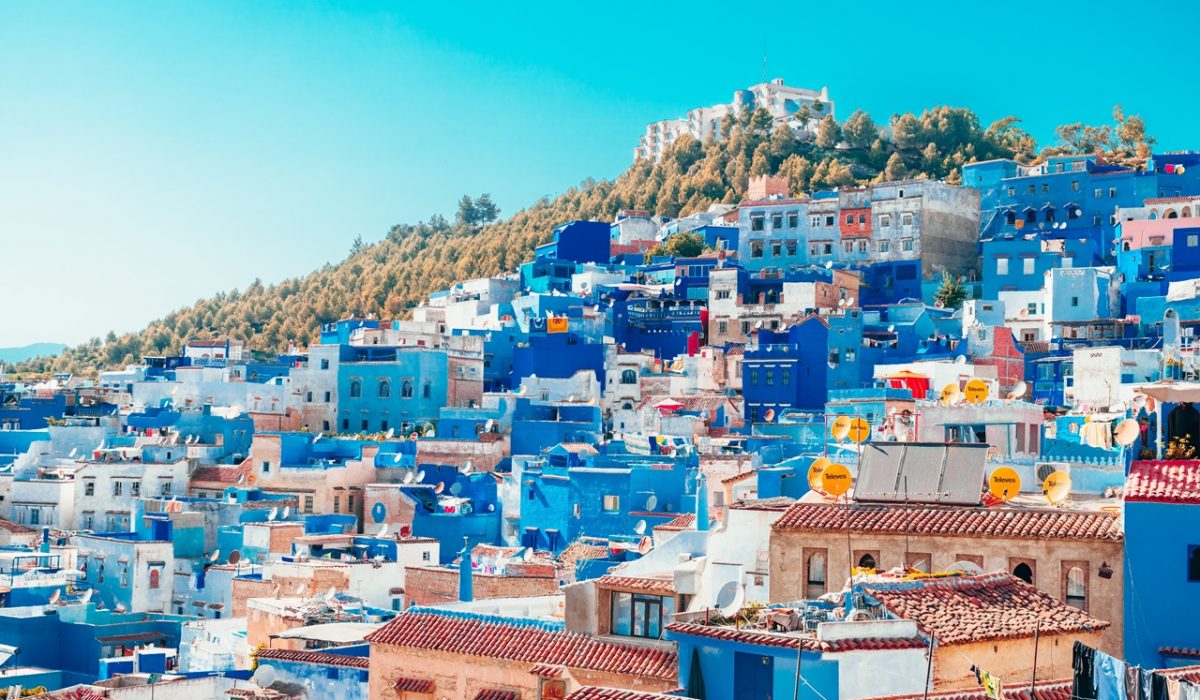
Morocco is a stunning oasis in the northern end of Africa. Famed for its breathtaking landscapes of the Sahara Desert, lively souks, and refreshing mint tea, the country is a staple in every traveler’s bucket list. Its Islamic, French, and African influences are evident everywhere, creating a unique yet interesting blend of sights and experiences. But before creating a list of things to do in Morocco, many tourists often wonder, is Morocco safe?
For every traveler, safety is one of the most important things when visiting a destination. In Morocco, first-time travelers might get lost in the maze of streets and souks while others may have difficulty adapting to the country’s cultural norms. But as long as you do proper research and exercise safety precautions, your trip to Morocco should be stress-free.
Continue reading this helpful guide for all safety-related queries and reminders before visiting Morocco, the Gateway to Africa!
Is Morocco Safe for Female Travelers?
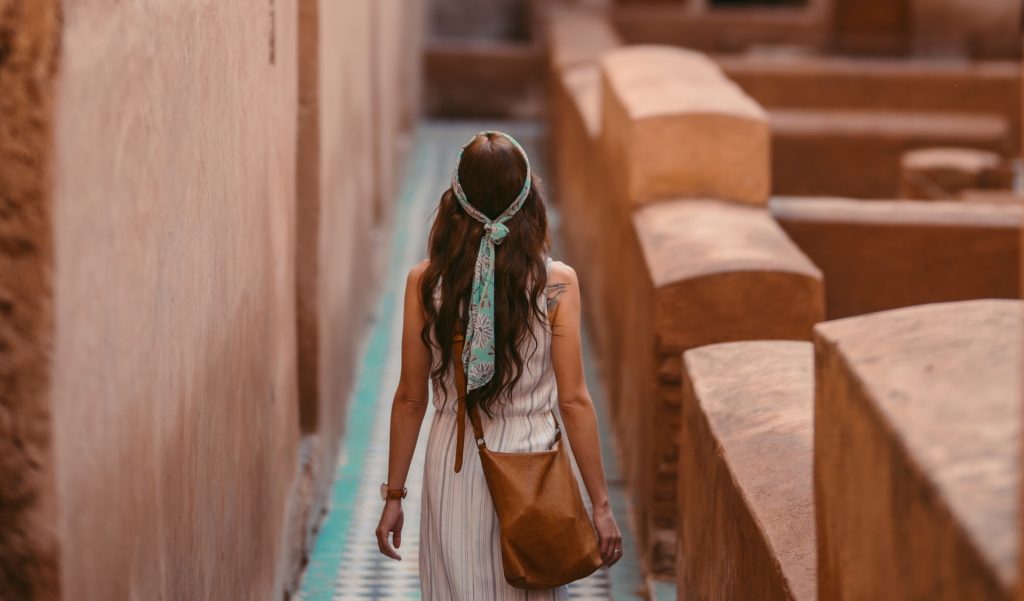
Photo by Taryn Elliot on Pexels
Although Morocco is a relatively safe destination for everyone, female travelers will have to exercise more caution. Female travelers, especially solo female travelers, are most likely to attract unwanted attention. Unfortunately, catcalling and minor harassment is still common among female travelers. Usually, locals will compliment your looks or try to approach you, and the best way to deal with this is to simply ignore it.
But despite this, always remember your purpose of travel: to discover and explore Morocco. Sure, it can be a bit daunting to think about the possible catcalling and verbal harassment you might encounter, but as long as you ignore it, you should be able to enjoy your vacation. Aside from the usual safety protocol when traveling, female travelers can book their stay at an all-female hostel or dorm. You can meet fellow female travelers and be assured that you’re in a safer accommodation.
Is Morocco Safe for Solo Travelers?
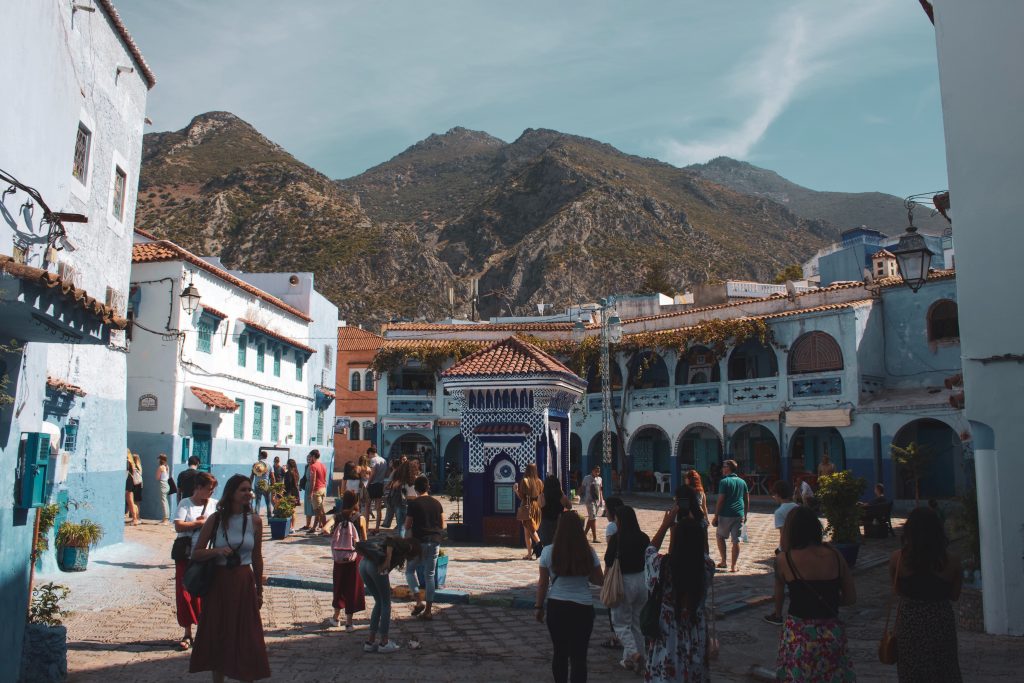
Photo by Mark Neal on Unsplash
With a variety of inexpensive hostels, guesthouses, and other forms of accommodation, Morocco is also frequented by solo travelers. But like female travelers, solo travelers can also attract unwanted attention from locals. Additionally, they are more likely to be approached by scammers since they are alone and appear to be an easy target.
So is Morocco safe for solo travelers? The answer is yes, but if you are traveling alone, you will need to be more cautious about where you go and who you interact with. Always be vigilant and be on the lookout for scammers disguised as overly friendly locals. Although nothing is wrong with exploring the beautiful scenery in Morocco alone, having company is also a great way to spend time in the country.
Is Morocco Safe for Families?
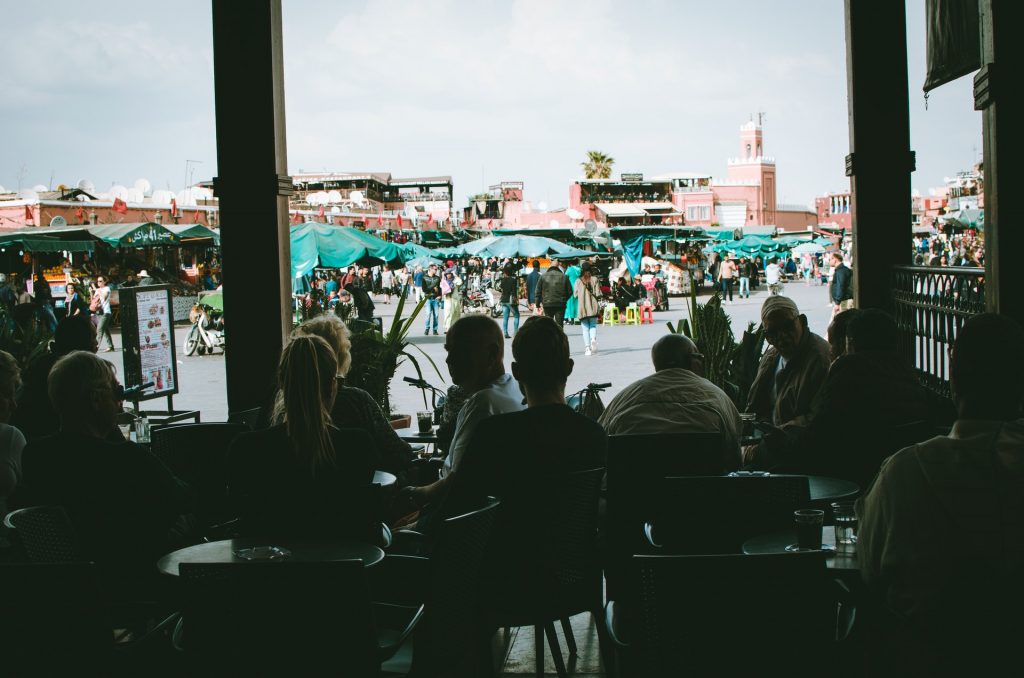
Photo by Nicolas Postiglioni on Pexel
If you plan on visiting Morocco with children, you’ll be glad to know that it is a family-friendly destination. Aside from having large families, Moroccan society values children so this is a great way of connecting with the locals. Moreover, there are several family-friendly hotels in Morocco with amenities suited for children. Families are also less likely to be targeted by scammers.
Before your Moroccan getaway with your family, make sure that your children have their basic vaccinations. Also, have a first-aid kit with you in case of small emergencies. Children are also advised against petting strays since these seemingly harmless animals could have rabies.
Travel Tips for a Safe Morroco Travel
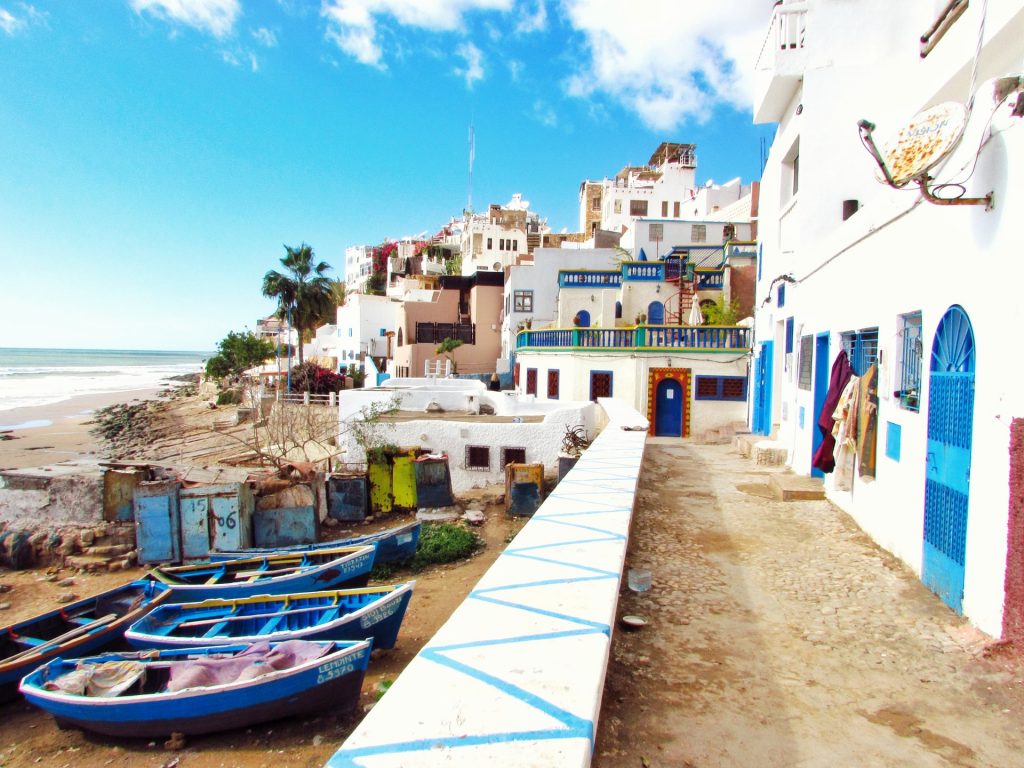
Photo by Louis Hansel on Unsplash
Food
Food in Morocco is a feast for the senses! With Andalusian, Spanish, and European influences, not only is it delicious, but it is also safe. But for tourists with sensitive stomachs, it’s best to take precautions when trying out new food. Bring your medications with you and inform your tour guide in advance of allergies or dietary requirements if you’re joining a food tour. Eating at restaurants is also safer as compared to eating at stalls which aren’t the most hygienic of places. Lastly, trust your gut. If the food smells unpleasant or if it looks a bit uncooked, you can refuse in a polite manner.
Water
Morocco’s tap water is treated and chlorinated, making it safe to drink. However, not all cities have good filtering systems so it’s best to avoid drinking from the tap. You can buy plastic bottles at supermarkets, convenience stores, or street-side stalls, or bring a refillable tumbler. That way, you consume less single-use plastics and help lessen plastic pollution in the country. Tourists can also bring portable water filtration devices to ensure that the water is safe to drink. Most hotels offer free water refilling stations which can help lessen the use of single-use plastics.
Public Transportation
Public transportation in Morocco is safe and is a good option for travelers who want to skip car rentals. The train network connects most of the major cities and is comfortable, fast, and has air conditioning. City buses are also safe, varying between modern buses with extra legroom and older models which are more affordable but are lacking in aspects like comfort. As compared to trains, buses tend to be overcrowded and there have been cases of groping and pickpocketing. Overall public transportation in Morocco is safe, but safety precautions still apply, especially for female and solo travelers.
Taxi
Taxis are one of the most common ways of getting around since you can easily find them anywhere in the city. They can also easily take you from point A to point B without having to make different stops. However, taxis are also notorious for being tourist traps, offering overpriced fares, especially for foreigners. Some taxis also drive beyond the speed limit and often ignore traffic lights. Before getting in the taxi, make sure that the meter is on and is working. You should also negotiate the fare since some drivers tend to inflate the price upon arriving at the destination.
Driving
Is Morocco safe for driving? Driving in Morocco is safe, especially in rural areas. Road conditions are good and are well-maintained. However, if you plan on bringing a rental car to urban areas like Rabat, Tangier, and Marrakech, driving can be stressful. The traffic in big cities is always heavy, roads are not in a good condition, and drivers are often aggressive. If you cross paths with the wrong person, this might lead to altercations on the road. That said, driving in Morocco’s metropolitan areas is better suited for experienced drivers. Just be sure to present your International Driver’s License to be able to rent a car.
Vaccines
Getting vaccinated before your trip to Morocco is a good way to stay safe and avoid certain illnesses on your trip. Although there are no compulsory vaccines needed for adults, Covid-19, rabies, typhoid, Hepatitis A and B, and tetanus vaccinations are recommended as per the CDC. If you’re an adventurous eater or you plan on joining food tours in Morocco, it’s highly recommended to get a Hepatitis A vaccine before your trip. As mentioned earlier, children will also need to have their basic vaccinations before visiting to ensure a safe trip. You may also consult your doctor or travel agent for more information on needed vaccinations.
Travel Insurance
Getting travel insurance isn’t a strict requirement when visiting Morocco, but it is helpful in case of unforeseen circumstances. When getting travel insurance, make sure it covers medical emergencies and coverage for luggage loss, theft, and damage. Your insurance should also include coverage for flight cancellations, delays, and missed flights if they are non-refundable. If you plan on hiking the Atlas Mountains, sandboarding, or diving, it’s also best to get coverage for adventurous activities.
Safety Tips in Morocco
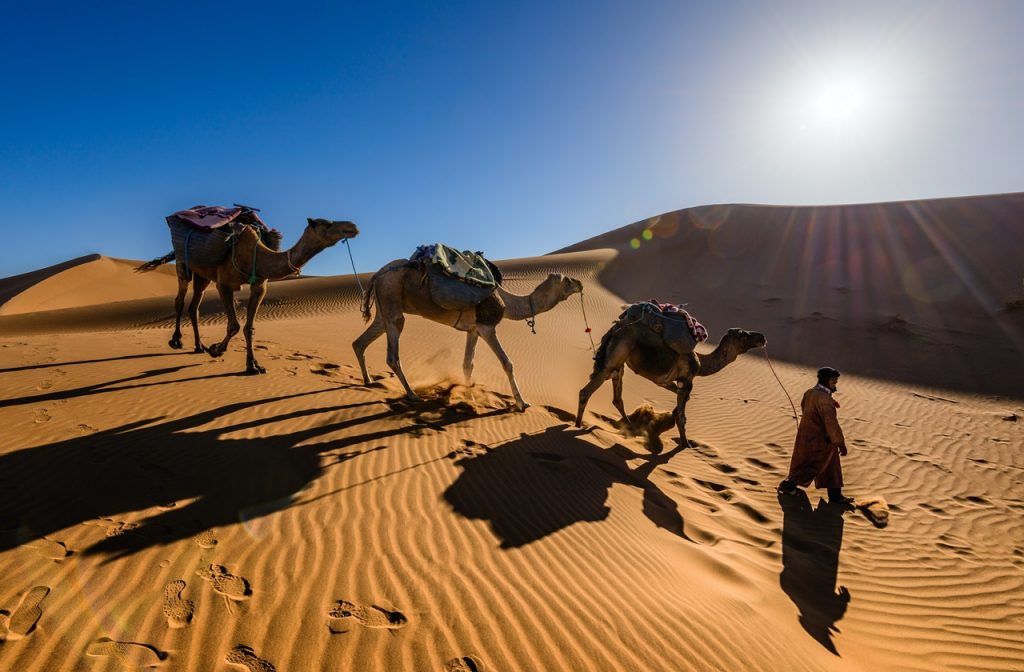
Photo by Sergey Pesterev on Unsplash
To guarantee a memorable and safe trip to Morocco, keep in mind the following safety tips and precautions:
Keep an Eye on Your Belongings
Since petty theft and pickpocketing are among the common crimes in Morocco, you should always be mindful of your belongings. Never leave your things unattended and hold your bags tight when passing through crowded streets. Even if friendly locals are offering to watch over your bags for you, simply say no as this could be a setup.
Travel Light (And Smart)
Planning on different things to do in Marrakech? Stay safe and avoid bringing unnecessary things, especially valuables. Make sure to bring enough money for your trip, especially if you’re planning to go shopping. For a destination that has cases of pickpocketing, it’s ideal to bring a belt bag since it’s smaller and easier to carry around. Otherwise, use a small bag.
Avoid Wearing Eye-Catching Jewelry
Although pretty to look at, sparkling necklaces and colorful earrings may attract unwanted attention. Jewelry is also often a sign of wealth, and scammers and thieves are more likely to try to scam or rob you on the streets.
Dress Accordingly
Respecting local customs is one way to guarantee a safe trip to Morocco. As a conservative Muslim country, tourists are expected to dress modestly. Avoid wearing miniskirts, sleeveless clothing, and any other clothing that exposes the shoulders and legs. That way, you won’t stand out as a tourist and avoid catcallers and unwanted attention.
Book Your Tours From Official Websites
It’s important to have a guide who knows their way around the dizzying streets and souks in Morocco. But if you plan on hiring a guide, make sure to do so online or via licensed travel agencies. There may be guides offering you tours at well-known landmarks, but there’s a chance that some of them are fake tour guides who will offer on-the-spot tours and charge expensive fees.
Avoid Walking Alone
Walking alone, especially at night, can make you an easy target for people with bad intentions. You are more vulnerable and prone to attract unwanted attention. That said, it’s always a good idea to buddy up with other travelers and explore as a group. If you have to walk alone at night, make sure to avoid dim streets and remote areas.
Be Familiar With Haggling
Most sellers in markets offer bargain prices for their goods. However, some sellers put a heftier price tag when they know they are selling to foreigners. In Morocco, your haggling skills will be put to the test at souks and medinas. You can also ask for assistance from your local guide if you’re not that confident in your haggling skills. Nevertheless, haggling is a normal practice when shopping in Morocco’s souks.
Avoid Making Direct Eye Contact with Strangers
One important thing to note before visiting Morocco is that women in the country don’t look men in the eye. While eye contact means acknowledgment in most countries, in Morocco, it is implied that a woman making direct eye contact means that she is interested sexually. To be safe, avoid making direct eye contact unless you know that person or the two of you are friends. You can also look around their mouth or nose area if you have to talk to them.
Carry Small Bills With You
To avoid carrying huge sums of money, make sure to bring small bills when shopping. This is also convenient since some taxis and shops don’t have enough change. Furthermore, this is safer since you won’t have to bring out larger bills in places like markets. Small change is also handy when tipping and buying inexpensive everyday necessities like bottled water.
Be Respectful of Local Customs and Practices
Before visiting Morocco, it’s important to learn about their local traditions and practices to avoid culture shock. From table etiquette, food choices, and even public displays of affection, there may be local customs that can be surprising for first-time travelers. Your intentions may be good, but locals might take offense to it and cause small altercations. To avoid this situation, it’s best to be familiar with Moroccan traditions and everyday practices.
Always Inform Someone About Your Whereabouts
This is more of a general safety tip when traveling, but there’s a reason why many travelers swear by this. Before going on a desert excursion or a trip to the mosques and tombs in Fez, make sure to let someone know of your plans. Whether it’s the hotel concierge or your friends and family at home, always keep them updated. Not only does it put their mind at ease, but it ensures that someone knows where you are in case of emergencies.
Common Scams/Small Crimes to Watch Out For
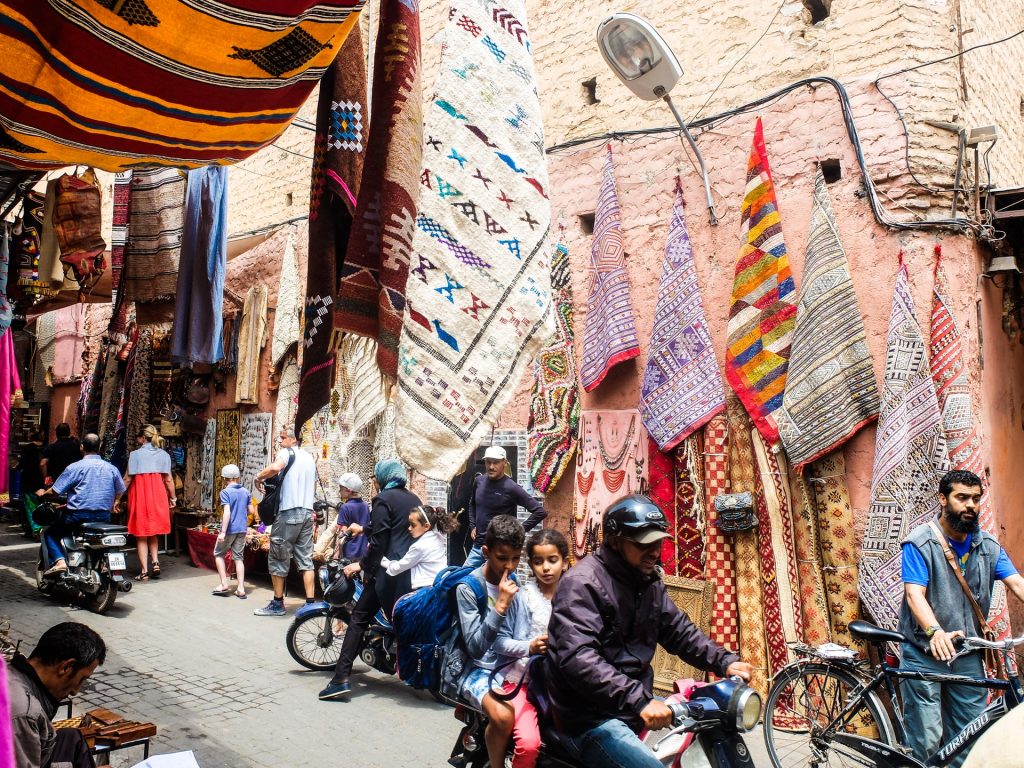
Photo by Max Brown on Unsplash
Despite being a relatively safe destination, Morocco has its share of petty crimes and scams that tourists need to be aware of.
- Pickpockets – Petty theft like pickpocketing is one of the more common scams to be careful of. These usually occur in crowded areas like souks, medinas, beaches, and other tourist attractions.
- Henna Tattoo Scams – Foreigners and tourists are the usual targets for this kind of scam. In this situation, a woman will randomly apply a henna tattoo on your hand and will offer to extend it to your arm. Whether or not you’re happy with the finished design, they will then demand payment.
- Unwanted Assistants – This happens when someone offers to take photos of you or show you around the best spots in the city, only to ask for payment after. They often come off as persistent and in some situations, demanding.
- Street Harassment – Female travelers, especially solo female travelers, are prone to this type of petty crime. Common types are catcalling while in some instances, men would block the door to restaurants.
- Pictures with Animals – At markets or in the city center, you may encounter people holding animals like snakes and monkeys. Then, they will ask you to take pictures with the animals and convince you to pay a large sum of money for the picture.
Is Morocco Safe?: Having an Unforgettable and Safe Vacation in Morocco
As long as you follow proper safety measures and do advanced research on what to expect, it is safe to travel in Morocco. However, it is important to note that while Morocco is generally a safe place to visit, female travelers and solo travelers will need to exercise more caution. They are more likely to attract unwanted attention from locals and scammers. While most locals are also friendly towards foreigners, it’s still important to be vigilant for any possible scam. But apart from this, visiting Morocco is a safe and memorable experience.
While planning your itinerary, make sure to learn a bit about the culture, tradition, and how Moroccans live on a daily basis. Don’t forget to read about the proper dress codes when visiting mosques and places of worship as they are some of the most beautiful places in the country. The last thing you want to happen on your vacation is not being able to go to some places due to the wrong dress code. Now, are you ready for a once-in-a-lifetime experience in this desert paradise?

